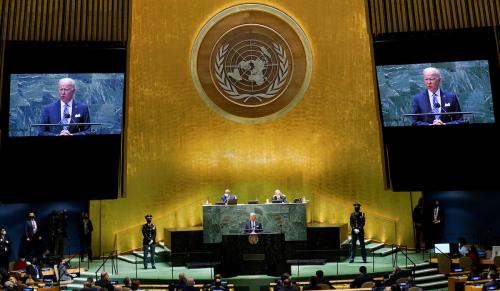Editor’s Note: President Obama has stated his commitment to enhancing service and volunteer opportunities for Americans both at home and abroad. David Caprara, the director of Brookings’s Initiative on International Volunteering and Service, explores the administration’s agenda in this Q&A.
Q: President Obama has been a long-time supporter of service and volunteer efforts. As his administration now commences in earnest, what are the major areas of focus we might expect to see from the president and his cabinet?
President Obama has just made his first successful mark on national service by supporting $201 million in new funding for Americorps and related national service programs adopted in the stimulus bill and signed into law as one of the first acts of his presidency. The administration has aims of expanding the Peace Corps and boosting AmeriCorps participation from 75,000 slots to 175,000 members.
In addition, the Administration is supporting “development 2.0” approaches by engaging the private sector, civil society and new media, which certainly include an expanded focus on volunteer service at home and abroad.
Q: Doubling the size of the Peace Corps to 16,000 by 2011 has been one publicly stated goal of the new Administration. What does the international service community think about this objective?
The Building Bridges Coalition, an outgrowth of the International Volunteering Initiative at Brookings, which includes more than 180 international volunteer service organizations and universities, strongly supports the President’s Peace Corps goal. The Coalition has also supported boosting overall global volunteering to 100,000 annually through a combination of doubling Peace Corps, enacting Global Service Fellowship funding along the lines proposed by Senator Russ Feingold, and authorizing Volunteers for Prosperity at USAID. These goals formed the basis of the Service Nation Summit’s global policy recommendations last year. Former Senator Harris Wofford (a legendary architect of service initiatives under Presidents Kennedy, Clinton and now Obama) and our International Volunteering team at Brookings helped to craft the recommendations following months of policy research and practitioner forums.
Q: The Obama administration has expressed an interest in establishing an “America’s Voice Initiative” to utilize Americans with foreign language skills for public diplomacy efforts, and to increase opportunities for older individuals to serve overseas in volunteer capacities. What would these types of efforts mean for America volunteer and service programs overall?
The Administration’s America’s Voice Initiative and multilateral approach to service signal a new direction that places greater emphasis on “track two diplomacy” and smart power assets represented in our nation’s greatest diplomats – our volunteers. Our project policy team and national advisors will continue shaping policy options that could make multi-lateral service a reality.
Q: Given its full agenda with the global financial crisis and new domestic programs, do you think Congress will take up new service policy proposals this year?
The Kennedy-Hatch “Serve America Act,” which was announced during the Service Nation Summit on September 11, 2008, stands a strong chance of passing in this Congress. We can base this projection on the foundation of a solid groundswell of bipartisan support, a broad popular mandate, and leadership by President Obama, who has embraced service as a central cause of his presidency. This week’s adoption of expanded funding for Americorps in the stimulus package is the first installment on this agenda.



Commentary
International Service and the Obama Administration
February 19, 2009